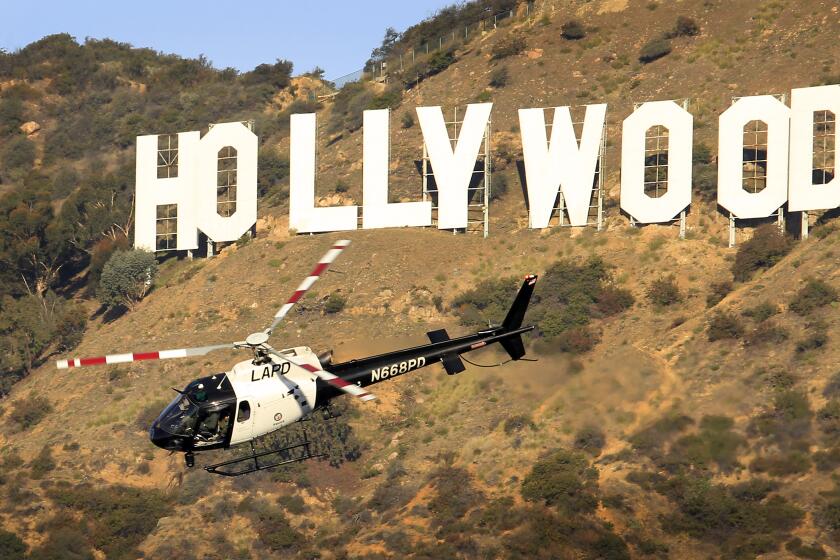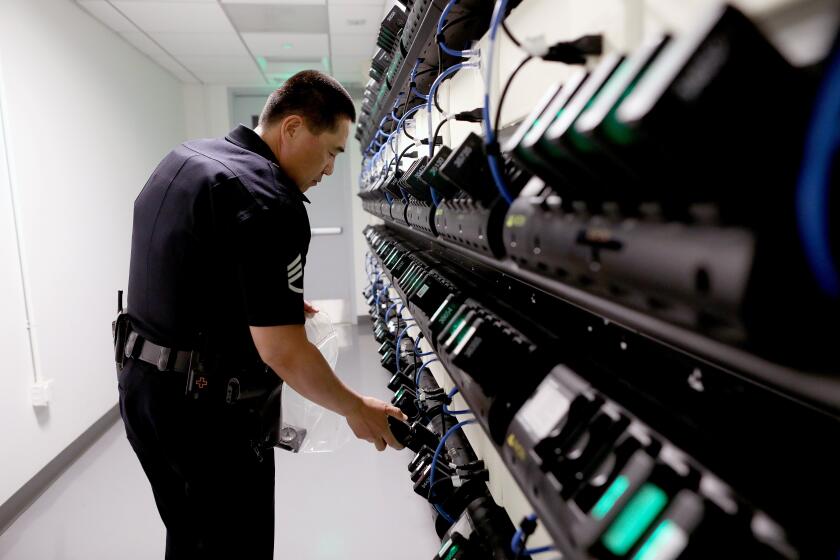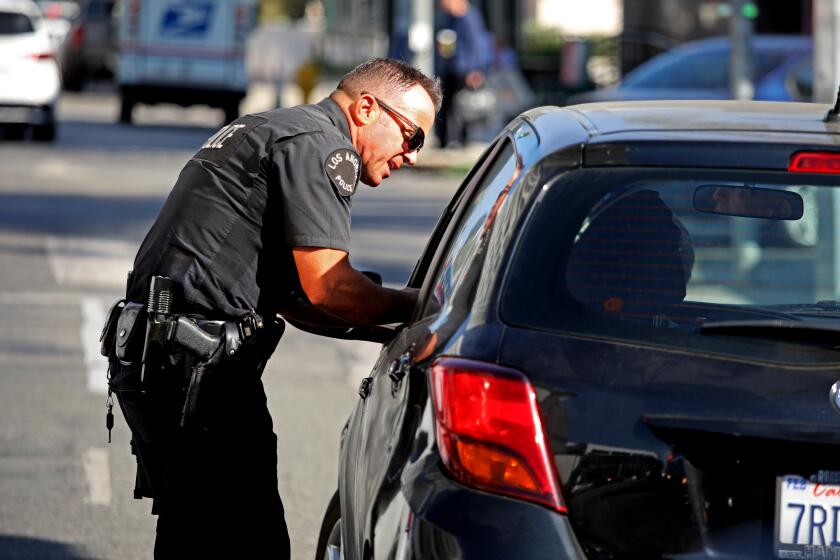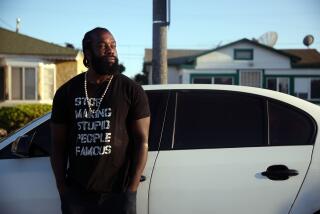Advocacy groups take LAPD to court over ‘violent’ traffic stop policy
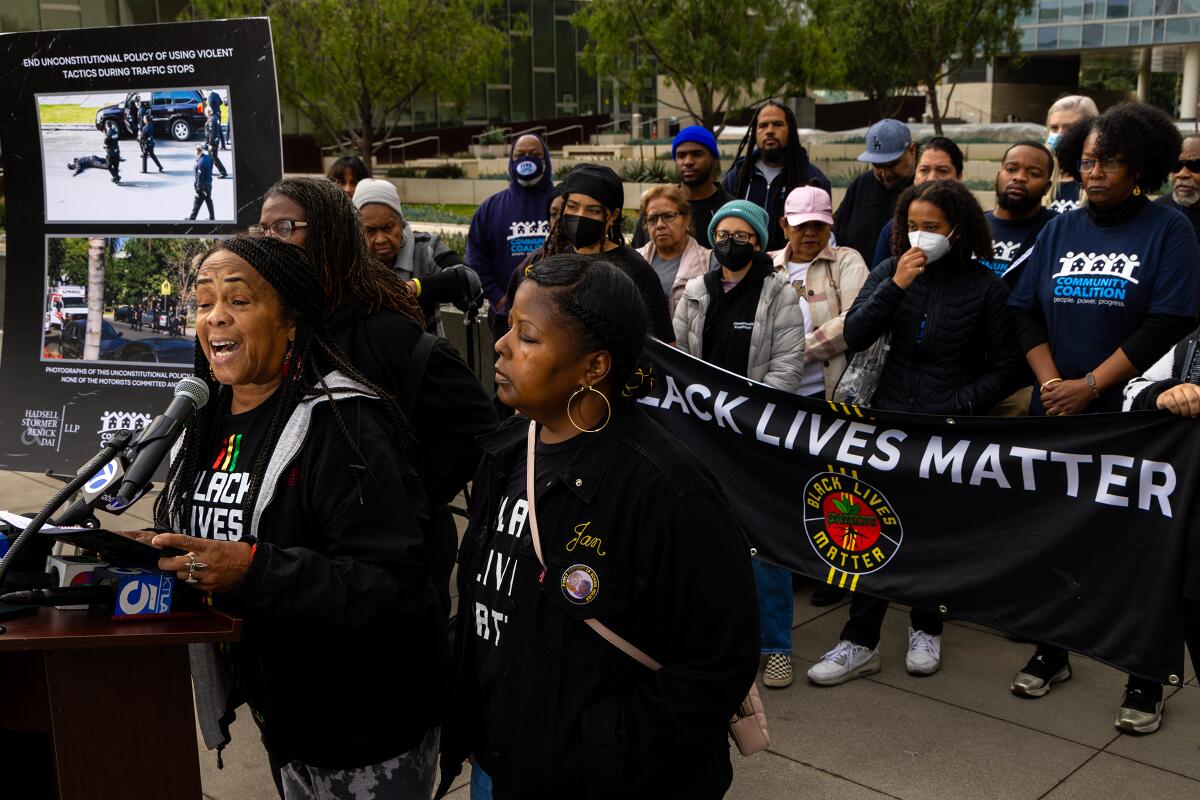
- Share via
A coalition of civil rights groups has taken legal action against the Los Angeles Police Department, seeking to force the agency to end an alleged practice of “high-risk” traffic stops, which the groups claim are based on faulty intelligence and undermine public trust in the police.
The court filing Tuesday in Los Angeles County Superior Court is a petition for writ of mandate on behalf of Community Coalition, Black Lives Matter-Los Angeles and Shailanee Sen.
Sen previously sued the department over an incident in Feb. 8, 2020, when officers ordered her and a friend out of a U-Haul truck they were driving because police mistakenly believed it was stolen. Sen, 36, later reached a settlement that saw the city pay her damages, without admitting to wrongdoing.
“Since that day, I have experienced flashbacks, fear of the police and anxiety while driving,” Sen said during a news conference outside LAPD headquarters to announce the filing.
L.A. City Controller Kenneth Mejia released the results of a months-long review of the Air Support Division, questioning ‘whether the LAPD has justified the need for the program’s current size and scope.’
The petition said that under LAPD policy, when officers encounter a vehicle they suspect is stolen, they are able to call for backup, a response that can include “at least seven and usually more police officers and a police helicopter.” The department conducts roughly 1,000 “high risk” stops based on suspicion of stolen vehicles per year, many of which involve Black and Latino residents, who have been disproportionately targeted in the past, the petition alleges.
Even if no crime is suspected beyond the stolen car, the petition said, officers can “draw and point their weapons at people inside the vehicle, order the people to get out of their vehicle and lie ‘prone’ face down and spread eagle in the street, and handcuff the people.”
The LAPD has not yet responded in court to the petition, and the department did not immediately respond to a request for comment Tuesday.
Rebecca Brown, an attorney with the civil rights firm Hadsell Stormer Renick & Dai LLP, said “not only are these stops dangerous and ineffective for public safety, they’re also illegal.” Brown pointed to a recent decision by the U.S. 9th Circuit Court of Appeals that found that the use of “high-risk tactics” based solely on reasonable suspicion violates the 4th Amendment’s ban on unreasonable searches and seizures.
In the wake of a gang unit scandal and concerns about officers misconduct, LAPD leaders are considering whether to use artificial intelligence to analyze vast troves of officer body-cam footage.
LAPD statistics indicate the stops are not effective crime-fighting tools, according to the petition, which cited data to show that “objects that could be used as weapons” were seized in less than 1% of such encounters.
Black Angelenos were involved in 18% of LAPD traffic stops of suspected stolen vehicles, even though they are only 8% of the city’s population, the petition said.
Based on LAPD data, about 74% of suspected stolen vehicles that were pulled over between 2018 and 2021 were not, in fact stolen, the petition said.
“LAPD knows that the vehicles it stops on suspicion of being stolen often are not stolen, that the risks posed by traffic stops of suspected stolen vehicles is very low, and that its policy is unneccesary to protect officer safety,” the petition said.
’
In a statement, the police union called the effort “the latest legal stunt by the police abolitionist group BLM-LA” and said that if the writ is granted, it “will serve no other purpose than to allow car thieves to get away with stealing more cars and place police officers in further danger as they attempt to investigate car thefts and other crimes.”
“Coddling criminals and decreasing enforcement are not the solutions to a safer LA,” the statement read. “Arresting criminals and holding their apologists accountable will keep us safer.”
In late 2019, the LAPD drastically scaled back on pretextual stops — a common tactic in which officers pull over random vehicles for a minor traffic violation to look for more serious crimes — after a Times investigation found that the department stopped and searched Black and Latino drivers at higher rates than whites. Police leaders such as Chief Michel Moore acknowledged at the time that such stops netted few arrests and undermined public trust.
Since LAPD’s new policy took effect, officers are making far fewer pretextual stops but finding illegal contraband more often, a Times analysis found.
Further restrictions on pretextual stops were enacted last March. A Times analysis that followed found that officers were stopping far fewer people for minor traffic violations like a broken taillight or tinted window and conducted fewer searches during those stops. A gang unit in the San Fernando Valley came under suspicion earlier this year over a range of misconduct, including inappropriate stops, misuse of body-worn cameras, and possibly a robbery, according to sources.
LAPD officials have said they would be willing to relinquish certain traffic duties, if picked up by another agency. But enforcement remains a top priority, they say, citing among other reasons the inherent dangers of traffic stops and a recent rise in accidents.
Earlier this month, a City Council committee heard a presentation about a long-delayed study of alternative traffic approaches by the Los Angeles Department of Transportation.
The report, which could serve as a foundation for new legislation, found that L.A. could follow in the steps of cities like Berkeley which have proposed having unarmed civilian workers handle most traffic enforcement. This, the report said, should be done in conjunction with with major infrastructure upgrades that improve safety along city streets that are among the nation’s deadliest.
More to Read
Sign up for Essential California
The most important California stories and recommendations in your inbox every morning.
You may occasionally receive promotional content from the Los Angeles Times.
